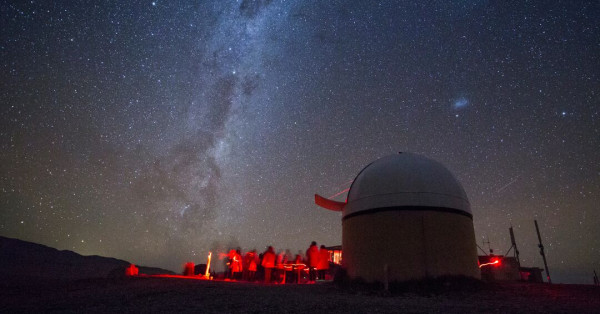NZ Post teams up with Dark Sky Project
Jun 9, 2025
One of our Ngāi Tahu Tourism businesses, Dark Sky Project, features in NZ Post stamp collection celebrating Matariki mā Puaka in 2025.
One of the world’s greatest natural wonders, a clear night sky has captivated humanity for millennia. For Polynesian navigators, the stars were more than beautiful, they were essential in guiding great journeys across Te Moana-nui-a-Kiwa to Aotearoa. Astronomy, rooted in observation and wonder, stands among the oldest natural sciences in human history.
“We’ve been celebrating Matariki with stamps since 2008 and this year we’re pleased to highlight six-star constellations, including Matariki, the Southern Cross / Māhutonga, and Taurus / Te Kōkota, which can all be seen in our skies this winter,” NZ Post’s Programme Manager Lynette Townsend says.
Popular Takapō-based astro-tourism experience, Dark Sky Project features in this year’s collection. Combining science and mātauranga Māori with awe-inspiring celestial views, Dark Sky Project offers internationally sought-after stargazing and astronomy experiences.
“Dark Sky Project plays a part in making sure New Zealanders have access to astronomy, and to the universally appealing hobby of stargazing. We were delighted to learn that it is celebrating its 20th anniversary this year. This stamp collection is one way to acknowledge the positive impact astrotourism has had at deepening our understanding of the stars,” she says.
Featuring an image of the Milky Way captured in the Aoraki Mackenzie Dark Sky Reserve, the stamps were developed in partnership with Dark Sky Project General Manager and Kāi Tahu astronomer Victoria Campbell. Campbell was a member of the Matariki Advisory Group charged with the task of providing recommendations to the Government on the establishment of the Matariki Public Holiday.
She says the constellations and star clusters featured on the stamps will all be visible in our pre-dawn skies this winter, with the best views available from Dark Sky Reserves, such as the one at Takapō.
“We’re very proud to share the beauty of our dark skies through this limited stamp collection. The stars we have highlighted are significant to us as descendants of navigators who applied their celestial knowledge to their everyday lives.
“We hope collectors will use this opportunity to engage with the names and patterns of the stars in our skies and through that connection be more aware of the importance of good lighting practices, so future generations can enjoy the stars at home like we can in Takapō.”
The stamps can be pre-ordered on the NZ Post Collectables website in advance of the issue date of 19 June 2025. They will also be available to purchase directly from Dark Sky Project in Takapō, and New Zealand’s highest post box located in the Astro Café at the top of Mount John.
Find out more about Dark Sky Project at darkskyproject.co.nz. Formerly known as Earth and Sky, Dark Sky Project is a joint venture between Ngāi Tahu Tourism and co-founders Graeme Murray and Hide Ozawa.
Visit collectables.nzpost.co.nz/darkskyproject to see the stamp collection.
More information about the stamps:
$2.90 Southern Cross/Māhutonga - The Southern Cross constellation, a national symbol of Aotearoa New Zealand, is visible year-round in the southern hemisphere sky. It has long been used for navigation, helping to locate the South Celestial Pole when used alongside other stars. Across the world, cultures have shared stories about the stars; in Aotearoa, some iwi (tribes) viewed the Southern Cross as the anchor of a great sky canoe.
$2.90 Taurus/Te Kōkota - The naming and interpretation of stars vary across cultures. In Aotearoa, the Hyades open star cluster—part of the constellation Taurus—and the adjacent bright orange star Taumata-kuku (Aldebaran) are known collectively as Te Kōkota.
$2.90 Orion’s belt & sword/ Tautoru & Te Kakau - Orion was named by the ancient Greeks, who saw the seven bright stars as a giant. A line of three stars forms his belt, from which his sword hangs. In Aotearoa, Orion’s Belt is known as Tautoru and, when including Te Kakau—another row of stars extending at an angle -is often referred to as a pot with a handle.
$2.90 Aries/Pipiri - Pipiri marks the first month of the maramataka, a traditional Māori lunisolar calendar, and is associated with the stars Hamal and Sharatan in the constellation Aries. Aries is an ancient star group that has historically been depicted as a sheep or ram by many early cultures. Its modern name is derived from the Greek and Roman myth of the Golden Fleece.
$4.00 Winter Triangle - This asterism—a recognizable pattern of stars—includes Betelgeuse, Procyon, and Sirius (Takurua), one of the brightest stars in the sky. Known as the Winter Triangle in the northern hemisphere, this group of stars is visible during summer in the southern hemisphere. Thanks to its bright stars, it's an excellent starting point for those new to stargazing.
$4.70 Matariki - Matariki is the Māori name for the star cluster also known as Pleiades, Subaru or the seven sisters. The Māori New Year is celebrated annually across Aotearoa New Zealand when, in mid-winter, the Matariki star cluster rises.